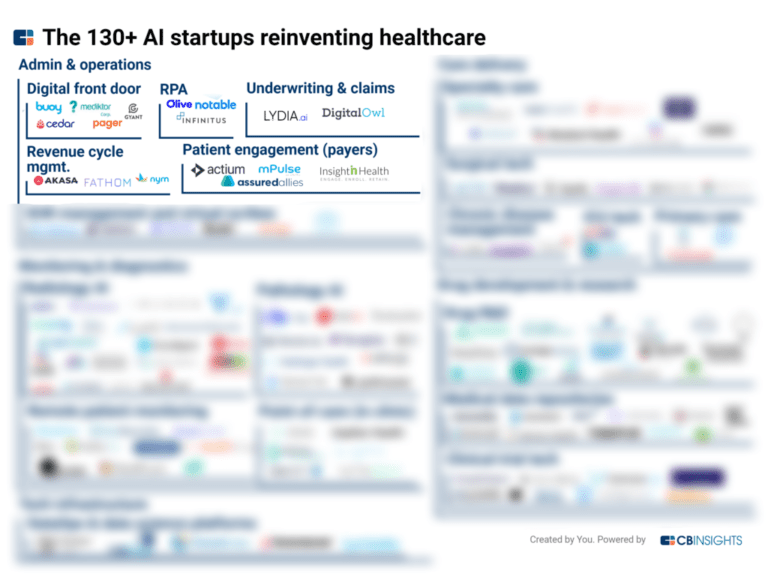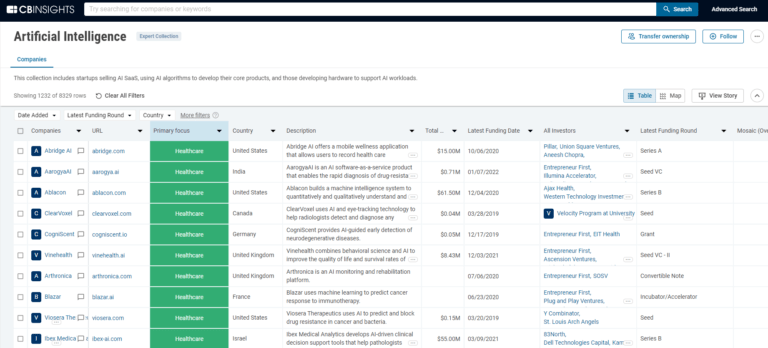
iCarbonX
Founded Year
2015Stage
Series A - II | AliveTotal Raised
$199MLast Raised
$45M | 8 yrs agoAbout iCarbonX
iCarbonX is a technology company focused on health monitoring and optimization. The company offers a platform and tools for digitizing, analyzing, and understanding life, delivering intelligent products and applications designed to help individuals make smarter choices. It primarily serves the health tech industry. It was founded in 2015 and is based in Shenzhen, Guangdong.
Loading...
Loading...
Research containing iCarbonX
Get data-driven expert analysis from the CB Insights Intelligence Unit.
CB Insights Intelligence Analysts have mentioned iCarbonX in 2 CB Insights research briefs, most recently on Feb 21, 2022.

Feb 16, 2022
The 130+ AI startups reinventing healthcareExpert Collections containing iCarbonX
Expert Collections are analyst-curated lists that highlight the companies you need to know in the most important technology spaces.
iCarbonX is included in 3 Expert Collections, including Unicorns- Billion Dollar Startups.
Unicorns- Billion Dollar Startups
1,244 items
Artificial Intelligence
14,769 items
Companies developing artificial intelligence solutions, including cross-industry applications, industry-specific products, and AI infrastructure solutions.
Digital Health
11,067 items
The digital health collection includes vendors developing software, platforms, sensor & robotic hardware, health data infrastructure, and tech-enabled services in healthcare. The list excludes pureplay pharma/biopharma, sequencing instruments, gene editing, and assistive tech.
iCarbonX Patents
iCarbonX has filed 1 patent.
The 3 most popular patent topics include:
- clusters of differentiation
- cytokines
- immune system

Application Date | Grant Date | Title | Related Topics | Status |
|---|---|---|---|---|
3/12/2021 | Transcription factors, Clusters of differentiation, Cytokines, Immune system, Immunology | Application |
Application Date | 3/12/2021 |
|---|---|
Grant Date | |
Title | |
Related Topics | Transcription factors, Clusters of differentiation, Cytokines, Immune system, Immunology |
Status | Application |
Latest iCarbonX News
May 12, 2023
Dalong Hu, SVP from XtalPi, Yingrui Li, co-founder of iCarbonX, and Phoenix Peng, co-founder and CEO of NeuroXess talked about cutting-edge tech in healthcare Credit: BEYOND Expo Every Wednesday and Friday, TechNode’s Briefing newsletter delivers a roundup of the most important news in China tech, straight to your inbox. Cutting-edge technologies are disrupting the healthcare and life science field. While recent headlines have largely focused on its content creation abilities, AI technology can also be used in drug development, anti-aging, and neuroscience. At the BEYOND Expo 2023 in Macao, Dalong Hu, SVP at XtalPi, co-founder of iCarbonX Yingrui Li, and Phoenix Peng, co-founder and CEO of NeuroXess, on Thursday discussed the cutting-edge technology now available in the fields of drug development, anti-aging, and brain science. The discussion has been edited and condensed for clarity. Dalong Hu, SVP, XtalPi Dalong Hu, SVP, XtalPi Credit: BEYOND Expo Currently, the implementation of AI in drug development is still relatively elementary. It can largely assist human thinking but cannot completely replace human work as in the fields of autonomous driving, security, and smart transportation. XtalPi has built a “trinity” drug development innovation model: the first step is to quickly generate molecules in large quantities through intelligent computing; the second step is to have experts manually evaluate the molecules; and the third step is XtalPi’s latest automated laboratory. There’s a four-stage cycle in drug development: Design, Make, Test, and Analysis. If the Design stage can improve efficiency and throughput through AI, the Make stage, which is the synthesis characterization stage of the compound, still uses traditional experimental methods — it’s still low in efficiency and throughput. XtalPi hopes to improve the efficiency and throughput of traditional drug experiments through an automated laboratory system, and with the help of intelligent automation technology, connect the cycles in the drug discovery process, ultimately achieving cost reduction and efficiency improvement. Unlike many light-asset AI companies in the market that only employ software engineers and basic drug development staff, XtalPi has now become a substantial heavy-asset company with a workforce of over 1,000 people. It’s possibly the largest AI drug development company globally, including more than 700 staff in research and development. The research and development team is diverse, including algorithm development, software development, drug development, digitization, and automation equipment departments. So far, XtalPi has participated in over 200 new drug development projects, with a real-time laboratory area of over 10,000 square meters, and more than 60 pipelines under development, including emerging models such as macromolecules, small molecules, ADC, and others. Some leading pipelines have obtained INDs in China and the United States and are about to enter clinical trials. XtalPi’s small-molecule drug discovery system is a drug discovery platform that integrates the three essential elements of XtalPi’s smart computing, expert experience, and automated experiments. Smart computing includes two sub-platforms, the AI drug discovery platform, ID4Idea, and the high-precision computational chemistry platform, ID4Gibbs. ID4Idea has a technical advantage in molecule generation, evaluation, and screening, while leading the industry in precision, flexibility docking, and throughput. Yingrui Li, co-founder of iCarbonX Yingrui Li, co-founder of iCarbonX Credit: BEYOND Expo Aging is not just about wrinkles or slower wound healing. In fact, aging has 10-20 different dimensions, each with its own causes and effects. To age better, one key technology is the quantification of human health. This means collecting enough data about a person to accurately determine their stage in life and whether each of their body systems — such as the immune, skin, and cardiovascular systems — are at the correct age, younger or older. To achieve this, scientists need a way to gather all possible data from the body and use AI to measure the different dimensions of aging. They also need models to integrate different types of data, including lifestyle, genetics, and molecular biology, to create what’s called a “digital twin” of the body, allowing individuals to understand where they are in their life journey. This personalized approach is very different from the generalized data provided by the current healthcare system. Finally, researchers need to use various types of technology to analyze the data and identify problems, as well as provide solutions. iCarbonX is combining healthcare services with other types of subscription or property-based businesses. In a building in Shenzhen, we are installing all possible healthcare monitoring and devices. Each apartment will have a terminal to measure people’s lifestyles and ultimately, their type. We will also try to collect health data from all residents in community healthcare centers to provide proactive medical care. Different from the past, where doctors passively waited for patients to come to them, we will enable doctors and community health services to actively interact with community residents to keep them as healthy as possible. Aging itself is not the problem — it is the diseases that come with aging that are the problem. Our ultimate goal should be to age healthily. The key to anti-aging is to actively pursue a life beyond one’s fate, rather than passively aging and becoming ill. Phoenix Peng, co-founder and CEO of NeuroXess Phoenix Peng, co-founder and CEO of NeuroXess Credit: BEYOND Expo The essence of human cognitive thinking lies in the firing signals of the 86 billion neurons in the brain. Brain-computer interfaces (BCIs) seek to study the firing patterns of neurons at the cellular level, decode the thoughts and signals of the brain and ultimately establish a pathway between AI and the brain. Elon Musk once said there is a significant information gap between the carbon-based and silicon-based forms of the human body, and the current pathways are highly inefficient. All BCI companies aim to expand the bandwidth of human thoughts, expressions, and receptions as much as possible after establishing a pathway. This is a long-term goal that requires a 15 to 25 year collaborative exploration. China’s ambitious Brain Project, which has been dubbed the fourth great scientific endeavor after the Manhattan Project, the Apollo Program and the Genome Project, aims to unlock the mysteries of the brain. Like the previous three initiatives, the success of the Brain Project will depend heavily on technological tools, such as the centrifuge for the Manhattan Project, the Saturn V rocket for the Apollo Program and the DNA sequencer for the Genome Project. In the case of the Brain Project, experts believe that brain-computer interfaces (BCIs) will be the key to unlocking the secrets of the brain, as they enable stable long-term reading and writing of dynamic networks of neurons on a large scale. Launched in 2021, China’s Brain Project is a 10-year, 50 billion yuan ($7.8 billion) scientific initiative. China is driven to spearhead the Brain Project and hopes to surpass the rest of the world in the field. BCIs are a typical interdisciplinary field that covers semiconductors, chips, materials, algorithms, robots, medicine, ethics, neuroscience, psychology and other cross-cutting domains. The core issue that NeuroXess, a Chinese BCI company, needs to address is how to use the brain to its maximum potential while minimizing damage to it. Achieving a balance between the two is a constant challenge. To bring BCI technology to commercial applications, high-throughput neural read/write capabilities, low-trauma approaches and long-term carriers are the three main technical obstacles that need to be overcome. Support TechNode With a small team, TechNode provides timely news and thoughtfully researched articles for worldwide readers interested in learning more about the Chinese tech industry. One-time
iCarbonX Frequently Asked Questions (FAQ)
When was iCarbonX founded?
iCarbonX was founded in 2015.
Where is iCarbonX's headquarters?
iCarbonX's headquarters is located at No.4018 Qiaoxiang Road, Shenzhen.
What is iCarbonX's latest funding round?
iCarbonX's latest funding round is Series A - II.
How much did iCarbonX raise?
iCarbonX raised a total of $199M.
Who are the investors of iCarbonX?
Investors of iCarbonX include China Bridge Capital, Tencent and Vcanbio.
Who are iCarbonX's competitors?
Competitors of iCarbonX include BioTwin and 1 more.
Loading...
Compare iCarbonX to Competitors

Banjo Health is a company that focuses on providing intelligent workflow solutions in the healthcare sector. The company offers a platform that uses artificial intelligence to automate and streamline the medical and pharmacy prior authorization process. This platform is primarily used by health plans and pharmacy benefit managers. It was founded in 2019 and is based in Washington, DC.

Syapse focuses on transforming real-world evidence into actionable insights within the healthcare sector. The company empowers healthcare organizations to collaborate and deliver patient insights to improve care, particularly for cancer patients. Syapse's services are primarily utilized by healthcare providers and organizations seeking to enhance patient outcomes through data-driven insights. Syapse was formerly known as BDLicense. It was founded in 2008 and is based in San Francisco, California.

Q Bio provides a healthcare platfrom. The company offers a clinical digital twin platform designed to assess the medical history of patients. It develops the Anatomical Foundation Model (AFM), an AI model for whole-body radiology aimed at automating the analysis of scans and risk evaluation. It was founded in 2015 and is based in San Carlos, California.
BioTwin focuses on medicine and health surveillance through the creation of virtual twins. The company's main offerings include the development of personalized healthcare solutions using a digital representation of an individual's health profile for real-time monitoring, predictive analysis, and customized treatment plans. It primarily serves the healthcare industry by providing tools for clinicians and health professionals to improve patient care. The company was founded in 2018 and is based in Quebec City, Canada.
Q-State Biosciences, now known as Quiver Bioscience, is a discovery technology and therapeutics company that operates in the healthcare and biotechnology sectors. The company's main focus is on creating transformational medicines for patients living with brain disorders, utilizing human disease models, artificial intelligence, and a proprietary platform. These tools enable the discovery of optimized genetically targeted medicines for conditions such as epilepsy, pain, and other diseases of the central nervous system. It was founded in 2013 and is based in Cambridge, Massachusetts.

Privia Health (NASDAQ: PRVA) is a technology-driven physician enablement company. It allows physicians to collaborate with medical groups to improve patient experiences by delivering care services in both in-person and virtual settings. It was founded in 2007 and is based in Arlington, Virginia.
Loading...
